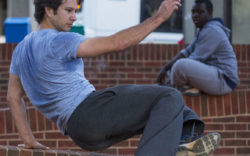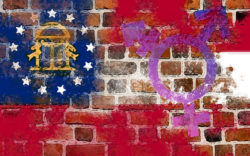Pagans do not worship Satan. They don’t sacrifice animals, they don’t wear hooded capes, and they don’t hang with Harry Potter. Stigma and misconceptions make many people reluctant to learn about some of the world’s oldest religions.
“They’re seeing it as an evil, negative thing, not that this is something organic that so many things have derived from,” says Lonnie Stewart, who shares the earth-centric beliefs of Native Americans.
Yet there are more Pagans around than you might expect. They’re not as visible as St. Joe’s schoolkids, but there are enough here in Athens for a club, a garden and an annual festival.
What’s a Pagan?
Paganism is a big world. It encompasses several indigenous faiths, known as paths. Wicca, Druidism, Heathenry, Shamanism and Hellenism are all Pagan paths drawn from ancient religions around the world. Many are polytheistic or pantheistic, though some Pagans choose not to worship a godhead at all. The most commonly worshipped deity is the Goddess, popularly depicted as Mother Nature but also celebrated in other forms. Pagan beliefs about the afterlife vary, but the idea of sin and salvation is a non sequitur in a “live and let live” class of religions.
People turn Pagan for different reasons. For Dianic witch Katy Sozaeva, it began as curiosity about herbalism and tarot. For Eclectic Lachele Foley, it was fascination with a New Orleans witch. Others, like Stewart, turn to alternative worship after feeling rejected or put off by mainstream religion.
Paganism is pretty DIY. Followers of the various paths freely modify and combine various pieces of them to create their own religions, meaning nary a pair of Pagans believes the same thing. One thing everyone agrees on, though, is a belief in and respect for the divine in nature.
“I always like the concept of Mother Nature as a manifestation of the Goddess,” says Kristina, a Wiccan with an interest in Shamanism who did not want her last name printed. (Many Pagans fear retribution for their beliefs from bosses and landlords and do not want their full names or photos of their faces made public.)
“Any time I go out in the middle of the woods, a good distance from any road, I can feel the energy coming from everything, almost as if the woods are buzzing,” she says. “Or the way you feel standing in the sunshine, and it just seems to engulf you. To me, it’s just a comforting feeling, like a hug from your mom.”
Stereotypes about sacrificial pyres and magic wands may not be accurate, but the moon mania is for real. The High Days, the eight major festivals commonly celebrated by Pagans, revolve around the lunar cycle. The Spring Equinox, Samhain and Yule are precursors to the Christian holidays Easter, Halloween and Christmas.
Many Pagans practice witchcraft, but it’s not the kind J.K. Rowling writes about. Some view prayer as a form of magic, as they do herbal medicine. Many trust palm and tarot readers, and others, like Martha Dickinson, think it’s “a lot of hooey.”
Like magic, worship has a variable meaning among Pagans. To Stewart, it means acknowledging the worth of her surroundings.
“When you’re worshipping, it means that you’re saying, ‘This has value, and this is why I’m giving it my attention,’” she says. “In that sense, every breath, every sunrise, every raindrop is something of worth and something of value. So, pretty much everything should be an act of worship.”
Sozaeva doesn’t perform rituals but tries to live in harmony with nature and those around her. She lives by the Witches’ Rede—“An it harm none, do as thou wilt.” Another key tenet of Wicca is the Rule of Three, which states that whatever energy a person puts into the world, positive or negative, will return to him or her three times. Many Pagans outside Wicca are mindful of a similar concept of cosmic justice.
“You have to take responsibility for your actions,” says Dickinson, who practices American folk magic. “You have to try to be a better person, because it will come back on you if you’re not. It makes you want to do better with people, and it makes you want to help stray animals. It makes you more positive in general, I think.”
Dickinson is rare in the Pagan community—she’s politically conservative. She says her volunteer work with Republican and tea party groups has given her the opportunity to educate people who might otherwise know nothing about the hedge magic she practices.
How to Get Started
Most Pagans start out with Wicca, Foley says. Many books and resources are available for fledgling Wiccans, but many find themselves drawn to other paths in time. Foley considers herself an Eclectic, meaning she draws from the various paths at whim and gets to create her rituals as she goes along.
“It’s kind of like being an artist, but within a religious context,” she says. “So you have some way that you want to communicate with nature or a deity or deities or whatever, and you [ask], ‘What is it that I want to say? What do I want to bring about?’ And you sort of make up something that expresses that in the real world.”
Foley, like many American Pagans and most in Athens, is a solitary, meaning she practices her faith outside of a coven or other structured group. Whereas some Pagans worship in temples with high priests and priestesses, she performs her own rituals as her busy work schedule allows.
Solitude is the only choice for many Pagans. Even if one manages to find others in his or her area, there is little likelihood their faiths will perfectly align. And even in areas with many Pagans, Sozaeva says, covens can fall victim to power-mongering and legalism. Proselytizing is uncommon among Pagans, so they may have more trouble finding one another than locating a church with a marquee out front.
Instead, several communities exist to bring Pagans together online, offering tips for performing rituals, casting spells and facing the trials of following ancient religion in the modern world. There is even an international organization that advocates for Pagans’ civil rights and religious freedom, the Lady Liberty League.

Still, local Pagans find fellowship in Athens Area Pagans, an organization Foley started. The group meets weekly for dinner and tends the Lyndon House Arts Center herb garden. It also hosts several psychic fairs each year to raise money for Athens Pagan Pride Day, an annual event held to celebrate Paganism and educate the public about it.
Stewart chose to raise her children in another faith community, the Universalist Unitarian Fellowship. She wants to expose them to as many belief systems as possible while teaching them tolerance.
“It’s not my place to tell them what to believe,” she says. “It’s my job to impart to them the critical thinking skills needed to analyze all available data and make their own decision based on what they feel is right.”
Paganism isn’t a back-pocket religion—it’s a lifestyle. Respect for nature and awareness of one’s actions carry over into practitioners’ professional and political concerns. Stewart is a vegetarian due to her concern for nature, and Sozaeva votes with Mother Nature in mind.
“It’s no coincidence that natural disasters are increasing,” she says. “After all, how would you react if someone started cutting into you and stealing your blood and the minerals from your bones? It’ll just become worse until we realize that we don’t own the earth. We’re just borrowing it from future generations.”
On the rare occasion that their religious choices come up in conversation, Athens Pagans say, they usually encounter more curiosity than hostility. Stewart, however, has experienced an unexpected type of prejudice.
“When I wore my pentagram, a lot of people thought it was a Star of David,” she says. “It was funny that I’d get as much of a negative reaction from people thinking it was a Star of David as from people who knew what it was.”
Like what you just read? Support Flagpole by making a donation today. Every dollar you give helps fund our ongoing mission to provide Athens with quality, independent journalism.










